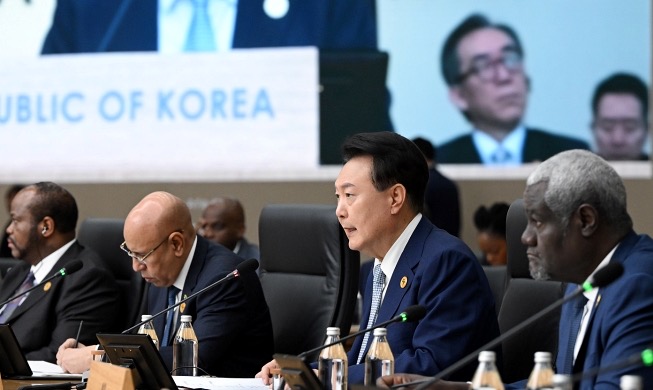Korean-African Future: Joint Growth, Sustainability and Solidarity

Dr. Mohamed Hasab Al-Rasoul
The partnership that South Korea seeks to establish with Africa is not an option, but a necessity. Seoul’s new leap towards the African continent is based on this statement made by the Deputy Director of National Security in Korea, Kim Tae-hyo.
The transformation of this emerging Asian country into a pivotal state on the global level has forced it to forge strategic partnerships that will take it to that position.
In light of the competition between the great and major countries, and the pivotal countries on the African continent, and its efforts to establish productive partnerships on the economic, political, military and cultural levels, South Korea took the initiative to consolidate and develop its relations with African countries, which were characterized by calm and cooperation in all fields. It held the first Korean-African summit in Seoul, with the participation of 48 countries, from June 4 to 5, 2024, under the slogan “The Future We Want to Build Together: Joint Growth, Sustainability and Solidarity.”
This summit was not the first summit to link Africa with countries or regional systems.
Arab countries preceded other countries in holding the first summits with Africa in 1977, when the Arabs realized the strategic importance of this continent in shaping the future of the Arabs, and in its role in shaping the future of the world by virtue of its geostrategic weight, resources, natural wealth, and political potential. The Arab-African summit looked to Africa and drew attention to the importance of partnership with it. In 1993, Japan launched the Tokyo International Conference on African Development (TICAD), then China entered Africa with the help of Sudan in 2000. In the same year, the European-African summit was held. Many summits followed, including: the Turkish-African, the Indian-African summit in 2008, the Iranian-African summit in 2010, the American-African summit in 2014, the Russian-African summit in 2019, and the Iranian-African summit in 2024. Africa is of particular importance from Korea’s perspective, as it sees Africa as a geostrategic space that provides it with a market for its products of approximately one and a half billion people, and a repository for the raw materials that Korea needs in its industry and investments, especially minerals, as Africa’s land contains 85% of the world’s manganese, 80% of platinum and chromium, and 47% of cobalt, addition to huge quantities of iron, phosphate, lithium, and nickel. South Korea has a long history with African countries dating back about 75 years, first established during the Korean War in the middle of the last century, during which African countries such as Ethiopia, Egypt, South Africa and Liberia supported Seoul, provided them with military support, and worked to strengthen its African relations after joining the United Nations UN in 1991. Despite this long history, the volume of trade exchange between it and African countries does not match the size of its economic capabilities, nor does it match the strength of its diplomatic relations.
Korea, which has a great economic standing that placed it in twelfth place globally and fourth in Asia with an economic capacity estimated at about $1.7 trillion, is absent from the economic scene in the African space, as the volume of trade exchange between them remained below the ceiling of one billion dollars.
Korea took the Korean Initiative for African Development, which it launched in 2006, which aimed to develop its political and economic relations with Africa, as an entry point for moving its African relations to the institutional stage. It strengthened it by establishing the Korea-Africa Forum, which is supervised by the Korean Ministry of Foreign Affairs in the same year.
Rice Belt Initiative, launched by the Ministry of Agriculture in July 2023, was added to them as part of a project aimed at achieving food security for the continent, which benefited 8 countries: Senegal, Gambia, Guinea, Ghana, Cameroon, Uganda, Kenya, and Guinea-Bissau. The initiative was designed to produce 10,000 tons of rice seeds by 2027, to provide food for about 30 million people in these countries.
Some Korean initiatives in Africa represent a type of soft power for Korea that enables it to reap its fruits in the political, diplomatic, and economic fields, particularly the Rice Belt Initiative, and the cultural initiatives launched by Seoul 3 decades ago, through which it forged close relations with actors in the fields of music, visual arts, and other forms of art, which created acceptance for Korea in some African societies that it can invest in to enhance its influence on the continent. The Korea-Africa Summit was not a media event, but rather a space for serious work. Seoul signed about 50 agreements with African partners during this summit aimed at enhancing joint cooperation in the fields of mining, energy, industry and trade. It also signed 12 memoranda of understanding with more than 10 countries, including: Egypt, Morocco, Tanzania, Ghana, Malawi, Zimbabwe and Madagascar. It also concluded about 20 contracts in investment and other fields. Korea did not stop at what was mentioned above, as it pledged to allocate $14 billion to support its companies’ investments in Africa, and pledged to increase its development aid to $10 billion by 2030.
It also promised to enhance its cooperation with African countries in the fields of digitization, e-government, education and capacity building, climate change, food security and vital minerals. With this summit, Korea crowned its African relations, took an important leap towards the future, and opened new and promising horizons for it, which enables it to achieve many strategic gains that push towards achieving the summit’s slogan: “The future we want to build together: shared growth, sustainability and solidarity.”
However, this requires establishing a win-win basis in the paths of African-Korean cooperation.



